Cannabis, CBD, Magic Mushrooms
THC and Neuroplasticity: Can Cannabis Rewire the Brain Like Psychedelics?
The modern resurgence of interest in brain health has put neuroplasticity — the brain’s ability to change, adapt, and form new neural connections — at the center of wellness conversations. From psychedelics to meditation to microdosing regimens, everyone seems to be chasing tools to rewire the brain for better mood, memory, creativity, and mental resilience.
Among the rising stars are psychedelics like LSD and psilocybin, shown to enhance neuroplasticity and create lasting changes in thought patterns. But what about cannabis, specifically THC (tetrahydrocannabinol)? Can cannabis stimulate neuroplasticity too — or does it work differently?
Let’s break down what science currently says about THC and brain plasticity, and whether cannabis has the potential to reshape your mind like classic psychedelics.
What Is Neuroplasticity?
Neuroplasticity refers to the brain’s ability to reorganize itself by forming new neural connections throughout life. This process plays a crucial role in:
- Learning new skills or languages
- Recovering from brain injuries
- Managing stress or trauma
- Creating or breaking habits
- Adapting to new emotional patterns
Enhancing neuroplasticity is a key goal in mental health, cognitive optimization, and even psychedelic therapy.
THC and the Brain: A Quick Overview
THC, the primary psychoactive compound in cannabis, interacts with the endocannabinoid system (ECS) — a complex cell-signaling system involved in regulating mood, appetite, memory, and neurodevelopment.
THC mimics a natural cannabinoid called anandamide, binding primarily to CB1 receptors in the brain, which are densely located in regions like the hippocampus, prefrontal cortex, amygdala, and cerebellum. These are areas involved in memory, emotion, and decision-making — all deeply connected to neuroplasticity.
Can THC Influence Neuroplasticity?
Emerging evidence suggests that THC and other cannabinoids can impact neuroplasticity, but the how and to what extent depends on various factors — including dose, frequency, age, and brain region.
✅ Potential Ways THC May Support Neuroplasticity
- Stimulation of Neurogenesis
Low doses of THC have been shown in animal studies to promote neurogenesis — the growth of new neurons — especially in the hippocampus, a key area for memory and learning. - Stress Reduction and Emotional Flexibility
THC, especially when combined with CBD, may reduce chronic stress and anxiety, which are known to suppress neuroplasticity. By calming the nervous system, THC may create a more fertile mental state for adaptive change. - Modulation of Synaptic Plasticity
The endocannabinoid system plays a regulatory role in long-term potentiation (LTP) and long-term depression (LTD) — the strengthening or weakening of synaptic connections. THC may influence these processes, although more research is needed to define the long-term effects. - Support for Habit Disruption and Perspective Shifts
Anecdotal reports and preliminary studies suggest THC may help people step outside habitual thought patterns, allowing for new insights and emotional reframing — similar, though usually less intense, than classical psychedelics.
⚠️ Where Cannabis May Fall Short Compared to Psychedelics
While there’s potential for THC to support neuroplasticity, it may not match the potency of psychedelics like LSD, psilocybin, or ketamine in this domain.
- Psychedelics directly stimulate glutamate and BDNF (brain-derived neurotrophic factor) pathways, both of which play essential roles in synaptogenesis and plasticity.
- THC does not appear to increase BDNF consistently, and high doses or chronic use may even suppress it in some brain regions.
Moreover, frequent or high-dose THC use may:
- Impair short-term memory and attention
- Reduce motivation (amotivational syndrome)
- Disrupt sleep cycles, which are vital for memory consolidation
These side effects can counteract the benefits of plasticity, especially in younger users.
The Role of Microdosing and Strain Type
Some users report microdosing THC — taking very low, non-intoxicating doses — helps with focus, creativity, and emotional resilience. Microdosing may provide gentle ECS stimulation without overwhelming the system.
Additionally, strain selection matters:
- Sativa strains may promote alertness and divergent thinking (creativity)
- Indica strains are often more sedating, helpful for trauma processing or emotional release
Balanced THC:CBD ratios may also mitigate anxiety and improve cognitive balance.
Final Thoughts: Can Cannabis Rewire the Brain?
Cannabis — particularly THC in mindful, moderate doses — has promising potential to support certain aspects of neuroplasticity, especially when used intentionally and in combination with practices like meditation, journaling, therapy, or breathwork.
However, it likely does not match the intensity or depth of plasticity induced by classical psychedelics. Instead, think of cannabis as a gentler, more accessible tool that can complement your mental growth — if used wisely.
In the end, it’s not just about the plant — it’s about the context, mindset, and integration practices that follow.

